INTERNACIONAL
The five liberal courts that tied Trump’s hands before SCOTUS clipped their power
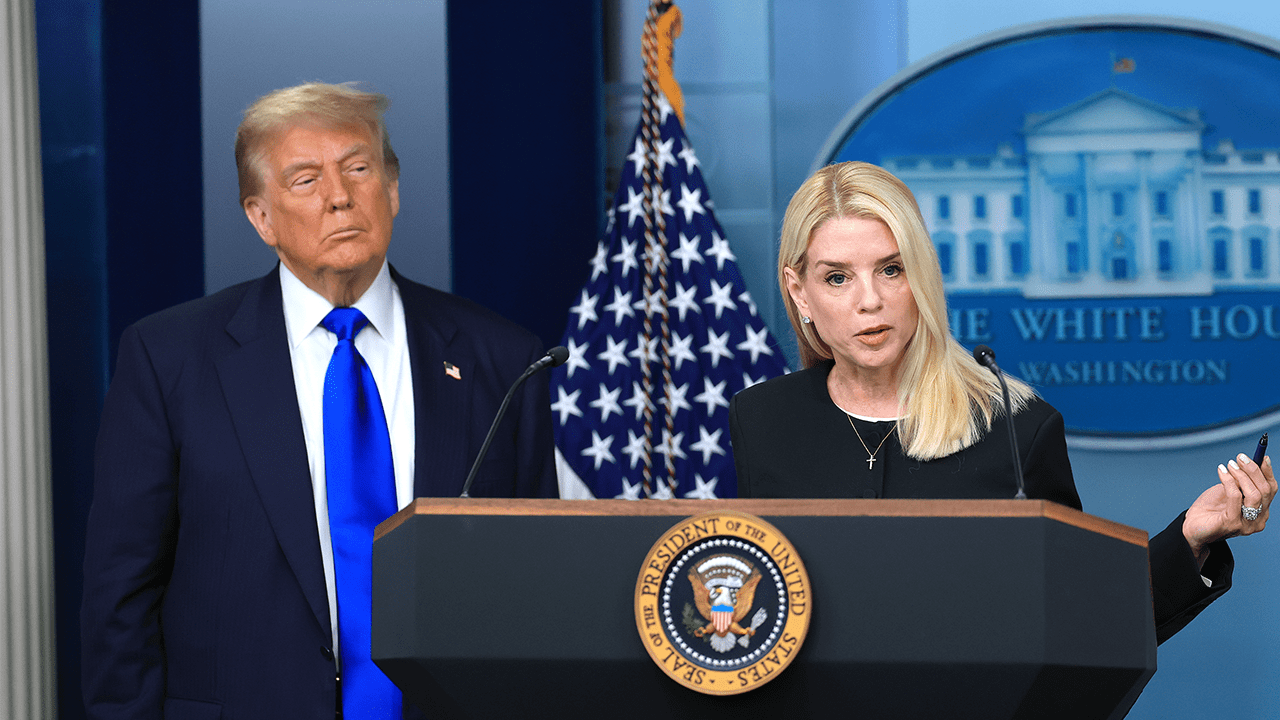
NEWYou can now listen to Fox News articles!
Nearly all the universal injunctions blocking President Donald Trump’s agenda were issued by just five of the nation’s 94 federal district courts, a statistic that the administration said lays bare the Left’s strategy of lawfare.
Trump and Attorney General Pam Bondi spoke at a news conference Friday just after the U.S. Supreme Court ruled in a 6-3 decision that district judges, the lowest-level jurists in the federal system, cannot impose nationwide injunctions. Bondi noted that out of 40 nationwide injunctions issued since Trump retook the White House, 35 came out of five districts perceived as liberal.
«Active liberal… judges have used these injunctions to block virtually all of President Trump’s policies,» Bondi said. «No longer. No longer.»
Nationwide injunctions are court orders that prevent the federal government from implementing a policy or law. They have a cascading effect impacting the entire country, not just the parties involved in the court case, and have been used against the Trump administration at a vastly higher rate than previous administrations.
SUPREME COURT POISED TO MAKE MAJOR DECISION THAT COULD SET LIMITS ON THE POWER OF DISTRICT JUDGES
Attorney General Pam Bondi speaks alongside President Donald Trump on recent Supreme Court rulings in the briefing room at the White House on June 27, 2025. (Joe Raedle/Getty Images)
Trump’s first administration faced 64 injunctions out of the total 127 nationwide injunctions issued since 1963, Fox News Digital previously reported. There were 32 injunctions issued against the Bush, Obama and Biden administrations collectively since 2001, meaning the first Trump administration was on the receiving end of double the amount of nationwide injunctions than his two predecessors and successor combined, according to an April 2024 edition of the Harvard Law Review.
Bondi pointed to the five district courts – Maryland, Washington, D.C., Massachusetts, California and Washington state – calling it «crazy» that such an overwhelming number of nationwide injunctions originated in those jurisdictions. Conservatives have accused the Left of bringing their cases in liberal judicial districts stocked with Democratic-appointed judges.
Fox News Digital looked at the five district courts and how judges in them have issued sweeping injunctions that have hampered Trump’s federal policies.
SUPREME COURT TO DEBATE TRUMP RESTRICTIONS ON BIRTHRIGHT CITIZENSHIP AND ENFORCEMENT OF NATIONWIDE INJUNCTIONS

President Donald Trump speaks during a media conference at the end of the NATO summit in The Hague, Netherlands, June 25, 2025. (AP Photo/Alex Brandon)
U.S. District Court for the District of Maryland
The Supreme Court agreed this year to take up three consolidated cases involving nationwide injunctions handed down by federal district judges in Maryland, Massachusetts and Washington state related to Trump’s birthright citizenship executive order.
The U.S. District Court for Maryland was one of the courts nationwide that issued an injunction against Trump’s January executive order to end the practice of granting birthright citizenship to the children of illegal immigrants. Maryland U.S. District Judge Deborah Boardman issued the injunction in February following a lawsuit brought by five pregnant illegal immigrant women in the state, which was followed by other district judges in Washington state and Massachusetts ordering injunctions of their own.
The Maryland district court also issued a separate preliminary injunction against the Trump administration’s executive orders ending federal support for diversity, equity and inclusion (DEI) programs in February.
The court recently came under fire from the Trump administration when the Department of Justice filed lawsuits against each of the 15 federal judges on the Maryland federal bench earlier this month for automatically issuing injunctions for certain immigration cases. The injunctions have prevented the Department of Homeland Security from deporting or changing the legal status of the immigrant in question for two business days.
JONATHAN TURLEY: SUPREME COURT COULD SOON GIVE TRUMP ‘ENORMOUS’ VICTORY IN BATTLE WITH LEFT-WING JUDGES
«President Trump’s executive authority has been undermined since the first hours of his presidency by an endless barrage of injunctions designed to halt his agenda,» Bondi said in a press release of the state’s automatic injunction practices. «The American people elected President Trump to carry out his policy agenda: this pattern of judicial overreach undermines the democratic process and cannot be allowed to stand.»
U.S. District Court for the Northern District of California
Judges on the bench for the Northern District of California have issued at least six significant injunctions hampering policies put forth by the Trump administration this year. The Northern California district court includes counties such as San Francisco, Sonoma and Santa Clara.
Back in March, Judge William Alsup, for example, granted a preliminary injunction ordering federal agencies to reinstate probationary employees fired under the Trump administration’s efforts to slim down the size of the federal government. Judge Susan Illston granted a temporary pause in May to the Trump administration’s federal reductions in force initiatives, and Judge William Orrick granted a separate injunction in April that prevented the Trump administration from withholding federal funds from areas deemed sanctuaries for illegal immigrants.
SCOTUS RULES ON TRUMP’S BIRTHRIGHT CITIZENSHIP ORDER, TESTING LOWER COURT POWERS
Federal judges on the Northern California bench also issued injunctions to block the enforcement of Trump administration polices related to organizations that promote DEI and LGBTQ programs and to prevent the administration from terminating the legal visa status of international students.
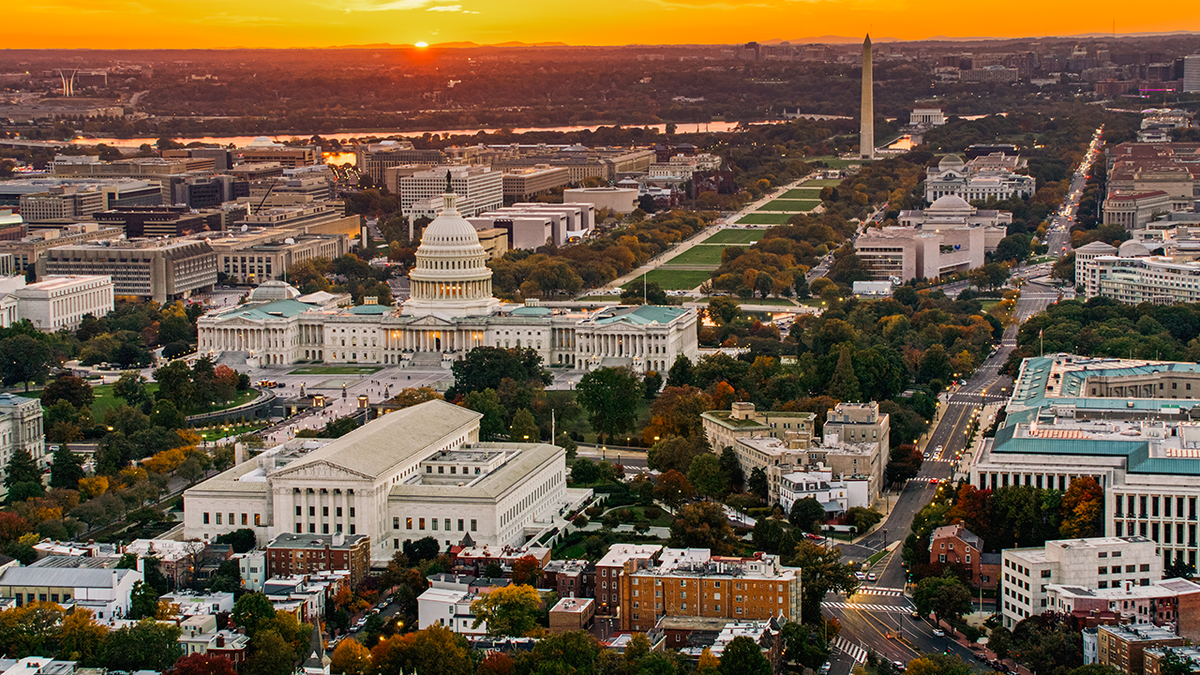
Helicopter shot of the U.S. Capitol and Supreme Court Building in Washington, D.C., at sunset, with the National Mall in the background.
U.S. District Court for the District of Columbia
The U.S. District Court for the District of Columbia has issued at least six signigicant injunctions against the Trump administration this year, including Judge James Boasberg’s March injunction preventing the Trump administration from deporting violent illegal immigrant gang members under the Alien Enemies Act – which received widespread backlash among conservatives.
«People are shocked by what is going on with the Court System. I was elected for many reasons, but a principal one was LAW AND ORDER, a big part of which is QUICKLY removing a vast Criminal Network of individuals, who came into our Country through the Crooked Joe Biden Open Borders Policy! These are dangerous and violent people, who kill, maim and, in many other ways, harm the people of our Country,» Trump posted to Truth Social in March following Boasberg extending his restraining order against the use of the Alien Enemies Act to deport illegal immigrants with alleged ties to gangs, such as Venezuelan criminal organization Tren de Aragua (TdA).
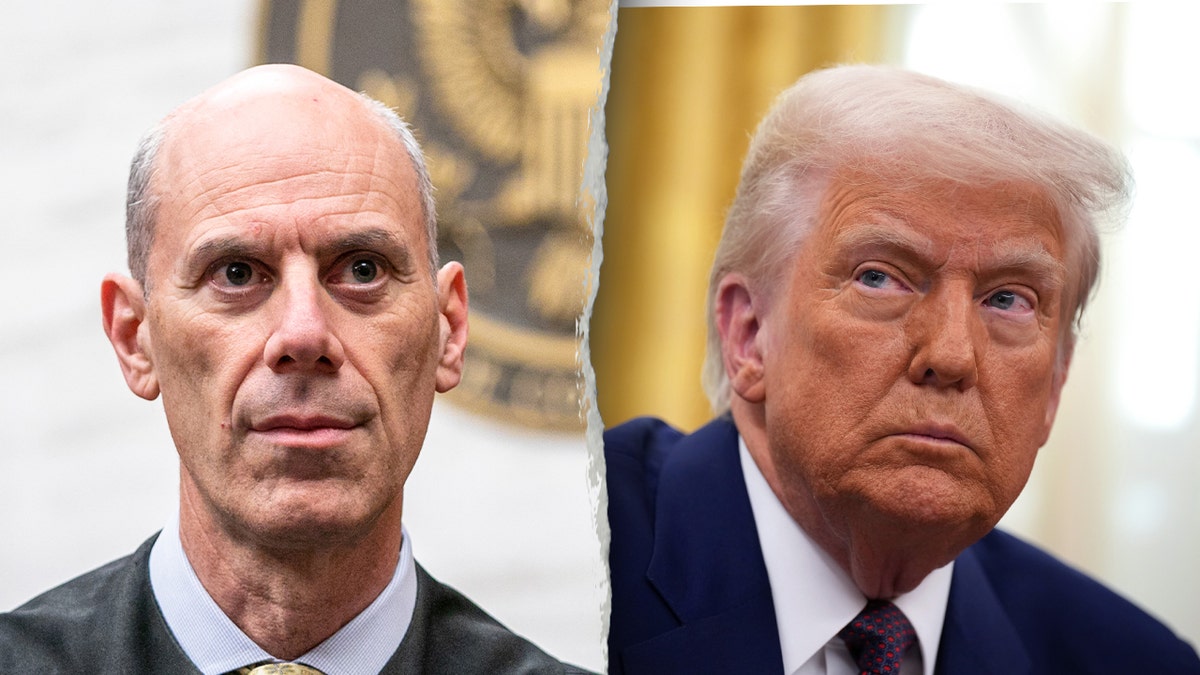
Federal Judge James Boasberg and President Donald Trump (Getty Images)
TRUMP CELEBRATES SUPREME COURT LIMITS ON ‘COLOSSAL ABUSE OF POWER’ BY FEDERAL JUDGES
Federal Judge Loren AliKhan issued a preliminary injunction in January barring the Trump administration’s freeze on federal grant disbursements through various federal agencies; Judge Paul Friedman blocked the Trump administration from targeting foreign service workers’ collective bargaining rights in May; and Judge Ana Reyes granted a nationwide injunction in March barring the Pentagon from enforcing Trump’s executive order banning transgender individuals from serving in the U.S. military.
Judges on the court have also issued injunctions targeting the Trump administration’s plans to dismantle the federally-funded state media network Voice of America, and another that blocked the Bureau of Prisons from implementing a Trump executive order restricting transgender healthcare and accommodations for federal inmates.
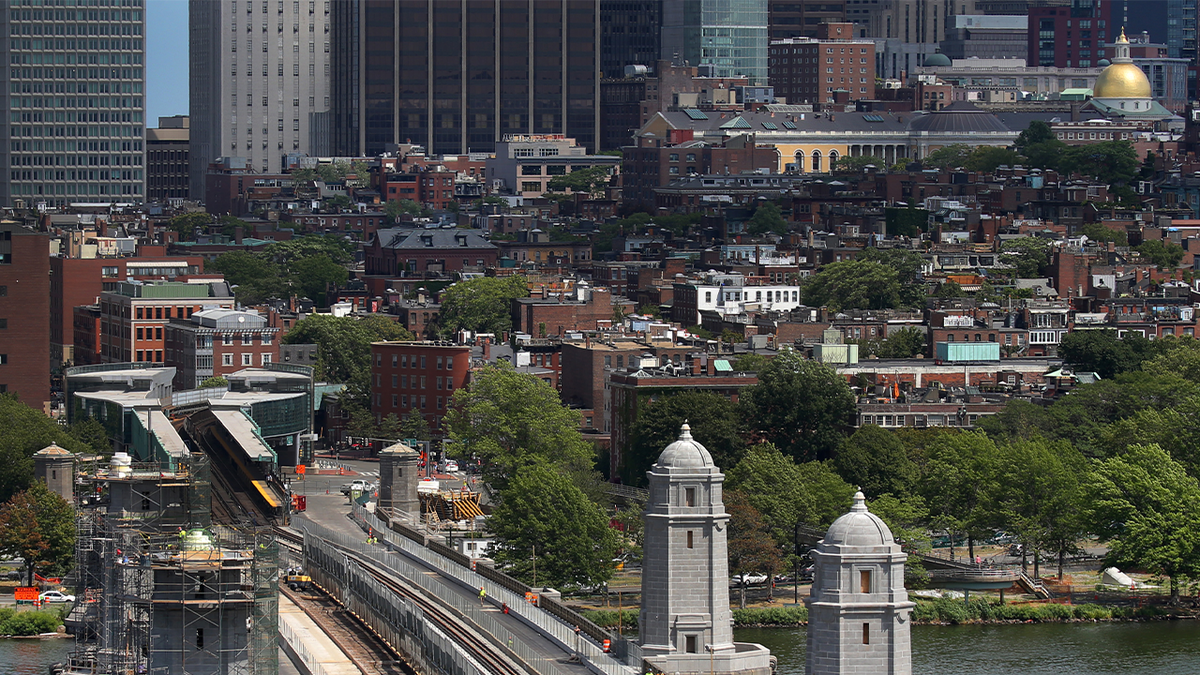
Boston, Massachusetts, skyline (Getty Images)
U.S. District Court for the District of Massachusetts
The U.S. District Court for the District of Massachusetts has issued at least four significant injunctions against the Trump administration this year, including the nationwide preliminary injunction barring Trump’s executive order ending the practice of granting birthright citizenship to the children of illegal immigrants.
JOHN YOO: TRUMP SCORES HISTORIC WIN AS SUPREME COURT REINS IN LOWER COURTS’ OVERREACH
Other injunctions issued this year include Judge Julia Kobick this month blocked Trump’s presidential action requiring passports to reflect a person’s biological sex and not their gender identity, and another that involved the Trump administration’s efforts to end a Biden-era parole program for hundreds of thousands of migrants from Afghanistan, Latin America and Ukraine.

Setttle’s skyline (John Moore/Getty Images)
U.S. District Court for the Western District of Washington
Ahead of the Supreme Court’s ruling limiting the scope of nationwide injunctions, judges on the District Court for the Western District of Washington issued a handful of injunctions targeting Trump policies, including joining courts in Maryland and Massachusetts earlier this year blocking Trump’s executive order ending birthright citizenship for children of illegal immigrants.
Judge Jamal Whitehead issued a preliminary injunction in February halting Trump’s January executive order suspending the U.S. Refugee Assistance Program. While another federal judge on the bench in March granted a nationwide preliminary injunction blocking Trump’s executive order barring transgender individuals from serving in the military.
The U.S. District Court for the Western District of Washington includes counties such as King – home to Seattle – Snohomish and Clark. The two courts for the Western District of Washington and the Northern District of California are both in the 9th Circuit.
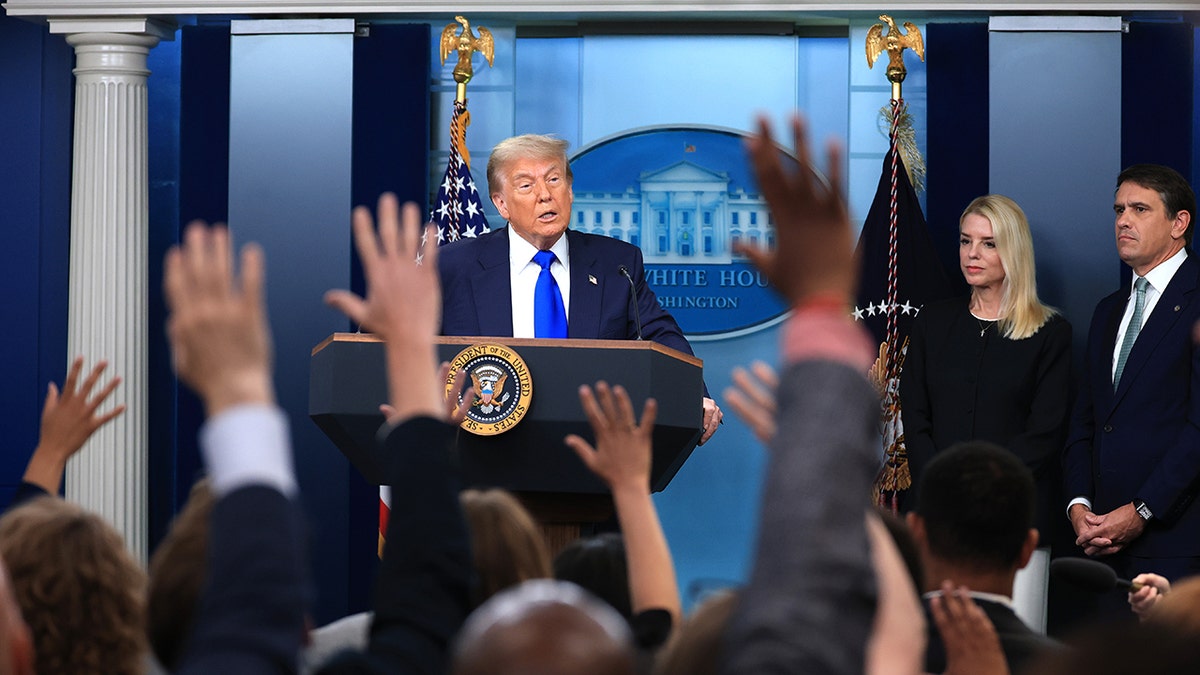
President Donald Trump, joined by Attorney General Pam Bondi and Deputy Attorney General Todd Blanche, speaks on recent Supreme Court rulings at the White House on June 27, 2025. (Joe Raedle/Getty Images)
NUMBER OF INJUNCTIONS HALTING TRUMP POLICIES TROUNCES PREDECESSORS BY DOUBLE
Trump celebrated the Supreme Court’s ruling restricting the scope of federal judges’ powers to grant nationwide injunctions as «a monumental victory for the Constitution.»
«The Supreme Court has delivered a monumental victory for the Constitution, the separation of powers, and the rule of law in striking down the excessive use of nationwide injunctions… I was elected on a historic mandate, but in recent months, we’ve seen a handful of radical left judges effectively try to overrule the rightful powers of the president to stop the American people from getting the policies that they voted for in record numbers. It was a grave threat to democracy,» Trump said on Friday.
TRUMP ASKS SUPREME COURT TO REVIEW BAN ON BIRTHRIGHT CITIZENSHIP
SCOTUS’ ruling followed the Trump administration filing an emergency appeal with the highest court in March, when the then-acting solicitor general, Sarah Harris, sounded the alarm that nationwide injunctions had hit «epidemic proportions» under the second Trump administration. She noted that the federal government faced 14 universal injunctions in the first three years of the Biden administration, compared to 15 leveled against the Trump admin in one month alone.
Universal injunctions were also a sticking point for officials in the first Trump administration, who railed against the flow of injunctions ordered against the 45th president’s policies and laws, including the former chiefs of the Department of Justice.
«Courts issued an average of only 1.5 nationwide injunctions per year against the Reagan, Clinton and George W. Bush administrations, and 2.5 per year against the Obama administration,» former Assistant Attorney General Beth Williams said in February 2019.
CLICK HERE TO GET THE FOX NEWS APP
«In President Trump’s first year in office, however, judges issued a whopping 20 nationwide injunctions – an eight-fold increase. This matches the entire eight-year total of such injunctions issued against President Obama during his two terms. We are now at 30, matching the total number of injunctions issued against the first 42 presidents combined.»
Fox News Digital’s Andrew Mark Miller, Breanne Deppisch and Ashley Oliver contributed to this report.
INTERNACIONAL
Ohio senator introduces ‘Holly’s Act’ for woman brutally beaten in viral Cincinnati attack

NEWYou can now listen to Fox News articles!
Sen. Bernie Moreno, R-Ohio, is introducing «Holly’s Act» after a woman was violently attacked by a mob in Cincinnati late last month – a move aimed at ending what he calls the justice system’s revolving door for repeat offenders.
The attack happened around 3 a.m. on July 26 at the intersection of Fourth and Elm streets in Cincinnati’s central business district.
Bystander video captured the moment a large group turned on several individuals early that morning, and in one video obtained by Fox News Digital, an unidentified man could be heard yelling racial slurs while being beaten in the street. Other footage appears to show the male victim striking a member of the group shortly before the altercation escalated.
In another video, a woman later identified only as «Holly» tried to intervene before she was slammed to the ground and knocked unconscious.
EXCLUSIVE: RAMASWAMY DECRIES ‘ANTI-LAW ENFORCEMENT CULTURE’ IN WAKE OF BRUTAL CINCINNATI BEATING
New video of the viral Cincinnati beating shows individuals yelling racial slurs as the violence unfolds. (Jay Black)
A single 911 call came several minutes after the incident, despite more than 100 people standing by, recording, or participating in the melee.
Moreno held a press conference in Cincinnati on Wednesday after meeting with city officials, the FBI special agent in charge, the future U.S. attorney, police chief and a deputy from the local sheriff’s department.
Moreno described the meeting as starting «a little rough,» but said it ended productively.
Ultimately, he said everyone at the table agreed to work together to make certain that what happened on July 26 never happens again. He also said he wants to make sure anyone who lives in Ohio can visit any of the state’s cities.
CINCINNATI VIRAL BEATING VICTIM FORCED INTO ‘SUPER-SECRET SPOT’ WITH SECURITY
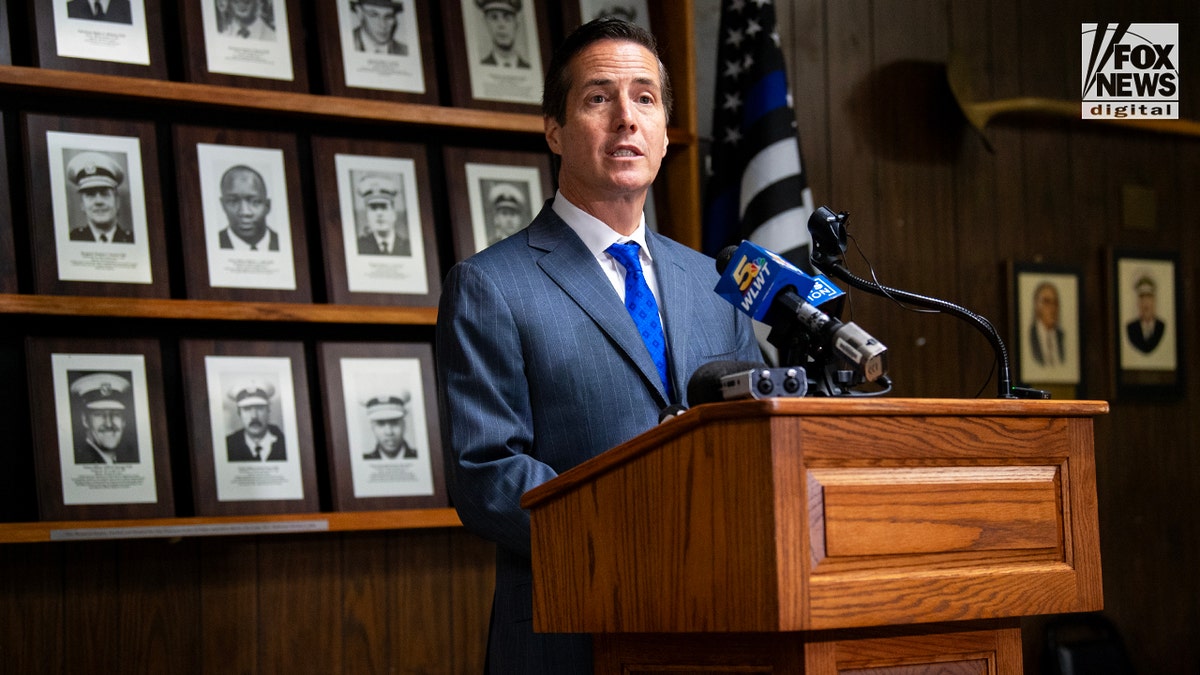
Sen. Bernie Moreno speaks at a press conference alongside Holly, a victim in the viral July 26 beating in Cincinnati, at the Fraternal Order of Police headquarters in Ohio on Wednesday, Aug. 6, 2025. (Julia Bonavita/Fox News Digital)
«We’re going to talk to some of our state legislators to see if we can put something in place that I call — with her permission — ‘Holly’s Act,’ which is how we raise the bar on minimum sentences, minimum bail requirements… We’re going to end the revolving door of injustice,» Moreno said.
«Our judges can no longer hide behind their cloak, and they have to be held accountable for not upholding law and order,» he added.
Law enforcement officials risk their lives every day to arrest criminals, which involves going out and making difficult arrests. But when those criminals appear in court, judges undermine the police officers’ efforts by «giving criminals a slap on the hand,» the senator said.
«Let’s be honest, because a lot of times you guys are qualifying this as a brawl,» Moreno told reporters. «This was attempted murder of an innocent woman. And that person had a rap sheet a mile long. Nobody who has that rap sheet should be walking the streets of any Ohio city free.»
FIFTH SUSPECT ARRESTED IN VIRAL CINCINNATI BEATDOWN AS VICTIM DETAILS HER ‘ONGOING BATTLE’
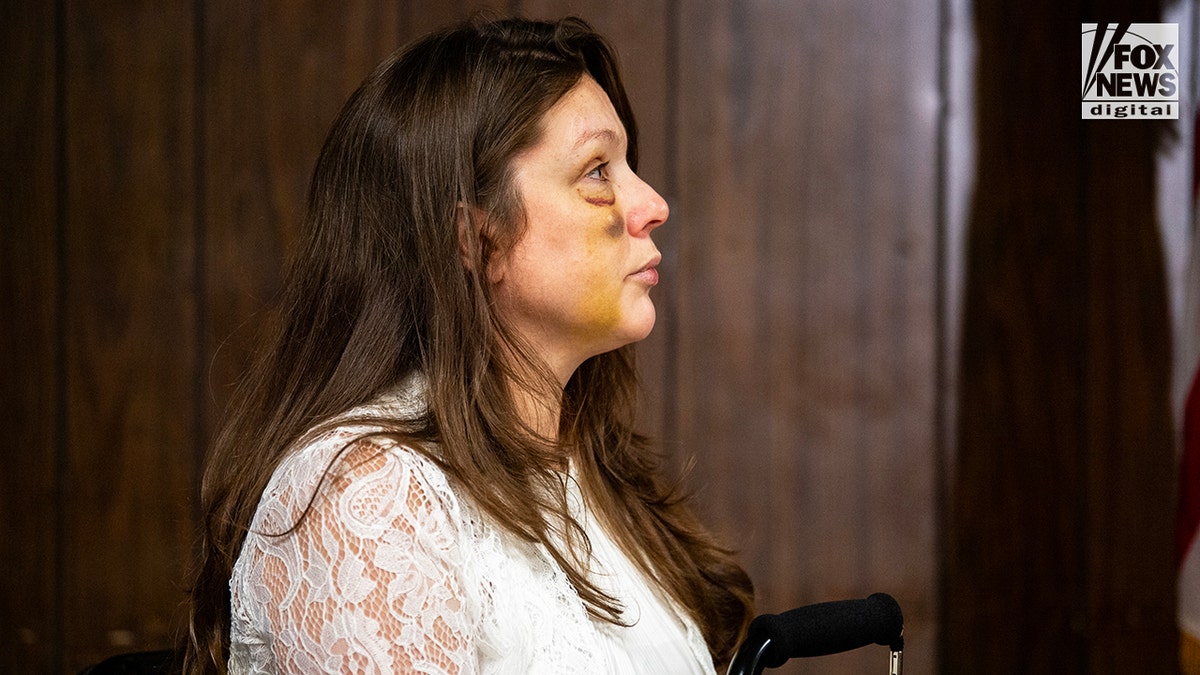
Holly, a victim in the viral July 26 brawl in Cincinnati, listens as Sen. Bernie Moreno speaks at a press conference at the Fraternal Order of Police headquarters in Ohio on Wednesday, Aug. 6, 2025. (Julia Bonavita/Fox News Digital)
Standing beside Moreno was Holly, who said she was focused on reform—not reliving the trauma.
«I’m here to talk about the future and how we can change it; how we can prevent this from happening to anybody else,» she said. «These heinous crimes have to stop. You know, I never want this to happen to anyone else, especially a mother, a daughter, or somebody who is loved.»
Holly said moving forward, more police officers are needed, as is justice reform that prohibits judges from letting people out of custody with a slap on the wrist.
«The man who attacked me, and might have permanently damaged me forever, should have never been on the streets, ever,» she said. «The fact that he had just gotten out of jail previously for something he should have been in there for years. It’s really sad to me because I can’t even fathom how many other people who have been attacked by the same type of man over and over and over in Toledo, in Columbus, Cincinnati, Dayton.»
FOURTH ARREST ANNOUNCED AS INVESTIGATION INTO VIOLENT CINCINNATI BRAWL CONTINUES
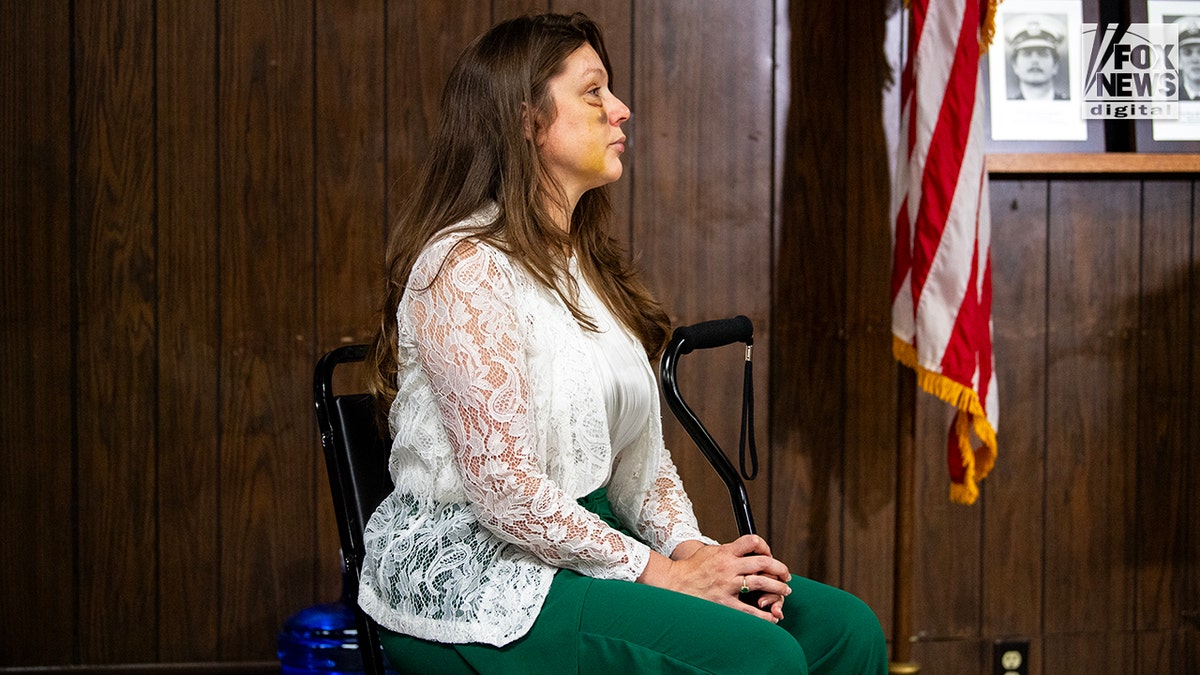
Holly, a victim in the viral July 26 brawl in Cincinnati, listens as Sen. Bernie Moreno speaks at a press conference at the Fraternal Order of Police headquarters in Ohio on Wednesday, Aug. 6, 2025. (Julia Bonavita/Fox News Digital)
Holly said what upsets her most is the public’s desensitization to violence.
Holly said she hopes one day there is some sort of bill that allows someone to be prosecuted or fined if they do not call 911 first to save someone’s life.
«We all need to help each other out and start helping humanity,» she said.
One reporter asked Holly if she felt like she was going to die that night.
«I truly felt like I was going to die,» Holly said. «I’m still shocked that I didn’t—and so are my doctors.»
RAMASWAMY PLEDGES ‘RULE OF LAW’ REVIVAL AFTER VIRAL CINCINNATI MOB ATTACK
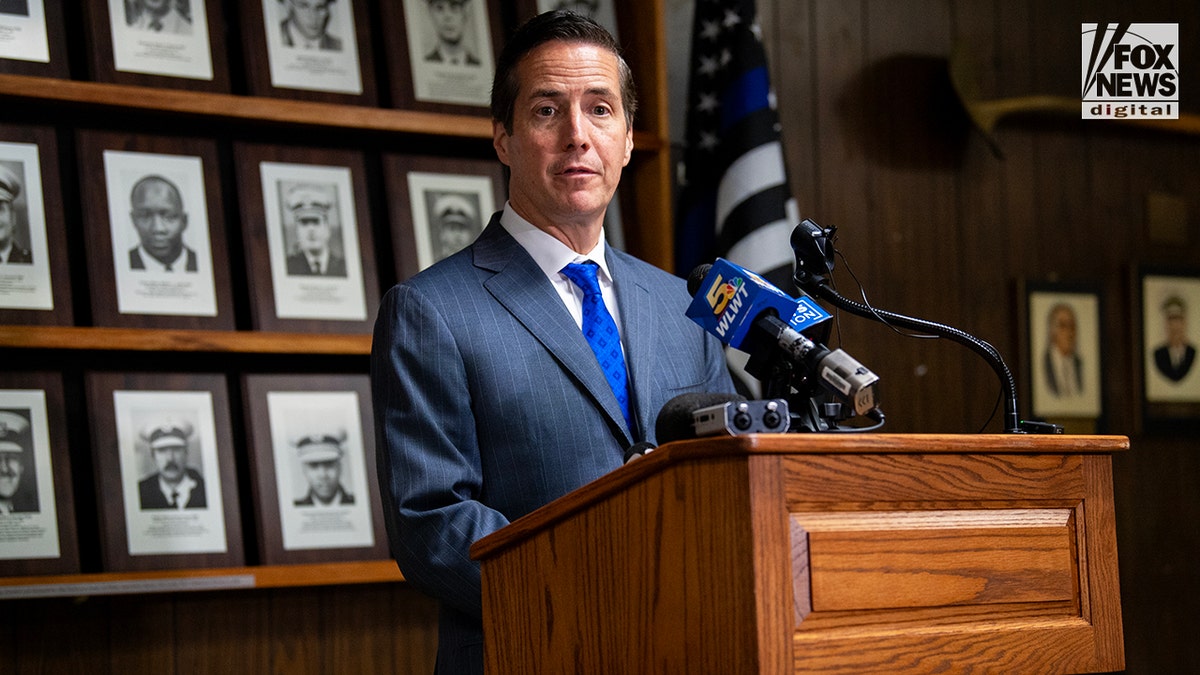
Sen. Bernie Moreno speaks about the viral beating in Cincinnati, at the Fraternal Order of Police headquarters in Ohio on Wednesday, Aug. 6, 2025. (Julia Bonavita/Fox News Digital)
Moreno told reporters that during the meeting, the attendees spoke about offering signing bonuses for police officers as a way to bring on more staff.
He said at the end of the day, a better police presence and better technology will help prevent incidents like that from July 26 from happening.
But Moreno also stressed how critically important it is for civilians to call authorities so that aid can be brought in as soon as possible.
«We’re not people that watch a woman get beaten to the inch of her life and our first instinct is to get out and videotape something so that you can be cool on Instagram,» he said. «That’s not who we are.»

A woman was violently punched in Cincinnati. (X/@Anthea06274890)
Several individuals have been charged in connection with what police describe as «a violent attack,» including Dominique Kittle, Montianez Merriweather, Jermaine Matthews, DeKyra Vernon, Aisha Devaugh and Patrick Rosemond.
Rosemond, 38, was taken into custody Monday afternoon by the FBI and Atlanta Metropolitan Major Offender’s Task Force in Fulton County, Georgia. He is charged with two counts of felonious assault and aggravated riot, according to the Cincinnati Police Department.
He is also charged with one count of fugitive from justice for a fingerprintable charge, according to the Fulton County Sheriff’s Office.
CLICK HERE TO GET THE FOX NEWS APP
He is currently being held in the Fulton County Jail while awaiting extradition to Ohio, police said. Rosemond is a Cincinnati resident and does not have any registered addresses in Georgia, according to records obtained by Fox News Digital.
A grand jury is scheduled to convene on Aug. 8 for the charges filed against Kittle, Vernon, Matthews and Merriweather.
midwest,senate,ohio,republicans,police and law enforcement,crime
INTERNACIONAL
El acuerdo entre Estados Unidos y Japón elimina barreras para autos, pero no conquista el mercado nipón

“Pensando en las necesidades básicas del mercado, sus autos simplemente no encajan”. La frase de Tsuyoshi Kimura, profesor en la Universidad Chuo de Tokio y exdirectivo de General Motors en Japón, resume la paradoja que persiste tras el reciente acuerdo comercial entre Estados Unidos y Japón. Aunque la administración de Donald Trump celebró la apertura del mercado japonés a los vehículos estadounidenses como un triunfo largamente buscado, la realidad del sector automotor nipón sugiere que el impacto será, en el mejor de los casos, limitado.
El anuncio de Japón de eliminar barreras a la importación de automóviles estadounidenses permitió a Trump proclamar una victoria en una batalla comercial que ha perseguido durante décadas. Para el presidente de EEUU, la omnipresencia de marcas japonesas en las carreteras estadounidenses contrasta de forma irritante con la escasa presencia de vehículos estadounidenses en Japón, una asimetría que, a su juicio, refleja la falta de reciprocidad en la apertura de los mercados y alimenta el persistente déficit comercial de Estados Unidos. Según The New York Times, la nueva estrategia de la Casa Blanca se apoya en el aumento de aranceles y la presión directa sobre otros países para que eliminen obstáculos, desde impuestos a productos agrícolas hasta requisitos técnicos y de contenido local en mercados como Japón e Indonesia.
El acuerdo más reciente con Japón se selló tras la imposición de un arancel general del 15% a los productos japoneses, inferior al 25% inicialmente amenazado. A cambio, Japón se comprometió a invertir cientos de miles de millones de dólares en Estados Unidos y, lo que Trump calificó como “quizá lo más importante”, a abrir su mercado a los automóviles y camiones estadounidenses. El principal negociador comercial japonés confirmó en rueda de prensa que el país aceptará la importación de vehículos fabricados en Estados Unidos sin exigir los estándares de seguridad y pruebas específicas que tradicionalmente han encarecido la entrada de estos productos. En palabras de Trump, “Japón abrirá su país al comercio, incluidos autos y camiones”.
La administración estadounidense replicó la fórmula con Corea del Sur, que aceptó el mismo arancel del 15% y la entrada de más vehículos estadounidenses sin gravámenes adicionales. No obstante, tanto en Japón como en Corea del Sur, la cuota de mercado de las marcas estadounidenses sigue siendo marginal.
El trasfondo de esta situación es complejo. Japón no impone aranceles a los vehículos importados desde finales de los años 70, pero los requisitos de seguridad y pruebas pueden sumar decenas de miles de dólares al costo de cada automóvil estadounidense, según analistas del sector citados por The New York Times. Además, el mercado japonés está saturado y dominado por marcas locales como Toyota, Honda y Nissan, que ofrecen una amplia gama de modelos pequeños, eficientes y adaptados a las calles estrechas y congestionadas del país. La mayoría de los consumidores japoneses prefiere vehículos compactos con el volante a la derecha, una configuración poco habitual en los catálogos estadounidenses.
La historia reciente refuerza el escepticismo sobre el efecto real de la eliminación de barreras. En 2016, Ford Motor abandonó Japón tras concluir que no existía un camino viable hacia la rentabilidad. El año pasado, las marcas estadounidenses representaron menos del 1% de las ventas de automóviles en Japón. Kimura, con experiencia directa en el sector, sostiene que “las barreras comerciales nunca han sido el problema”. Según su análisis, la falta de adaptación de los fabricantes estadounidenses a las particularidades del mercado japonés explica la escasa demanda: “Aunque se haya declarado que Japón abre su mercado automotor, es improbable que los autos estadounidenses se vendan”.
El propio Wilbur Ross, exsecretario de Comercio y presidente de la Japan Society, reconoce que los cambios regulatorios difícilmente convencerán a los consumidores japoneses. Para Ross, la eliminación de obstáculos comerciales responde más a un principio de equidad que a una expectativa real de incremento en las ventas. Relató a The New York Times una anécdota de su etapa negociadora con la Unión Europea sobre el veto al pollo estadounidense desinfectado con cloro: propuso que los productos se ofrecieran en los supermercados debidamente etiquetados y que el mercado decidiera. La administración Trump ha mantenido la presión sobre la Unión Europea para que abra su mercado a productos agrícolas estadounidenses, logrando que el bloque se comprometa a abordar “barreras que afectan el comercio de alimentos y productos agrícolas”, aunque sin detalles concretos.
El patrón de las negociaciones actuales evoca episodios de las décadas de 1980 y 1990, cuando las tensiones comerciales entre Estados Unidos y Japón alcanzaron su punto álgido, en parte por la cuestión automotriz. En 1995, Japón adoptó medidas para facilitar el acceso de los fabricantes extranjeros a su red de concesionarios, pero las ventas estadounidenses no aumentaron. En paralelo, los fabricantes japoneses intensificaron su producción en Estados Unidos, lo que diluyó el conflicto en las conversaciones bilaterales.

La dimensión política de estos acuerdos resulta ineludible. Alan Wolff, investigador del Peterson Institute for International Economics, observa que la insistencia de Trump en sectores concretos, como los automóviles o los productos lácteos durante la negociación del acuerdo Estados Unidos-México-Canadá, responde a su valor simbólico y electoral. “Tienen relevancia política para él, y por tanto para Estados Unidos”, afirmó Wolff a The New York Times. A su juicio, se podrían haber negociado cuestiones de mayor alcance, como los tipos de cambio, pero la prioridad presidencial ha sido asegurar concesiones tangibles en sectores emblemáticos.
La resistencia cultural y las preferencias de los consumidores japoneses han quedado ilustradas en episodios como el que vivió Glen S. Fukushima, entonces ejecutivo de AT&T y vicepresidente de la Cámara de Comercio Estadounidense en Japón. Tras un encuentro con el embajador estadounidense Walter Mondale, quien sugirió que su chofer en Tokio debería conducir un auto estadounidense, Fukushima probó un Cadillac Fleetwood. El vehículo resultó demasiado voluminoso para las calles cercanas a su residencia, por lo que regresó a su Nissan Cima y explicó la situación al diplomático. “Era un hombre razonable”, recordó Fukushima. “Lo entendió”.
Asia / Pacific,Corporate Events,YOKOHAMA
INTERNACIONAL
AWOL Dems’ flight from Texas may have been funded illegally by Beto O’Rourke nonprofit
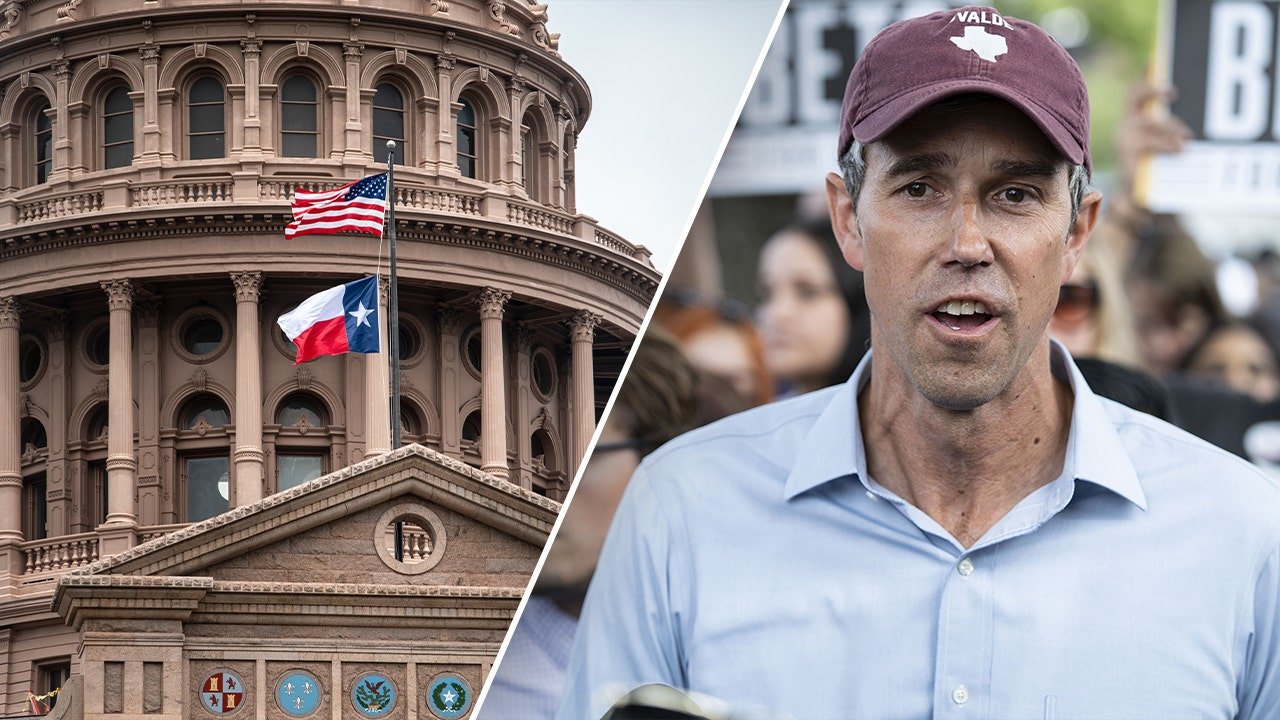
NEWYou can now listen to Fox News articles!
Following reports that former presidential candidate Beto O’Rourke’s nonprofit Powered by People was helping fund Texas state Democrats’ exodus out of the state to halt Republican redistricting efforts, Texas Attorney General Ken Paxton Wednesday announced he would be launching an investigation into the matter.
Texas House Democrats fled the state this week in an attempt to stop Republican efforts to redraw the state’s congressional maps. As a result, Texas House Republicans authorized civil arrest warrants for the absent lawmakers for depriving the House chamber of its ability to conduct official business. Meanwhile, Governor Greg Abbott subsequently called on the Texas Department of Public Safety to help arrest them. The civil arrest warrants, however, are only enforceable within state lines, and it is unclear how they will be executed.
Meanwhile, amid the partisan battle, a report from The Texas Tribune on Tuesday claimed that O’Rourke’s nonprofit founded in 2019 called Powered by People was among one of the main groups funding air transport, lodging, logistical support, and helping with the $500-per-day fines for the absent state lawmakers, citing anonymous sources involved with the fundraising efforts.
WATCH: TRUMP SAYS FBI ‘MAY HAVE TO’ HELP TEXAS ROUND UP AWOL DEM LAWMAKERS
Texas Attorney General launches probe into former Democratic presidential candidate Beto O’Rourke over allegations he is helping finance the exodus of state lawmakers from the state who are trying to halt GOP redistricting efforts. (Getty Images)
The report followed a warning issued by Abbott, indicating the fleeing state lawmakers could potentially be in felonious territory if they solicit, accept or agree to accept funds «to assist in the violation of legislative duties or for purposes of skipping a vote.»
«Any Democrat coward breaking the law by taking a Beto Bribe will be held accountable,» Paxton said in a press release announcing the probe Wednesday. «Texas cannot be bought.»
In Paxton’s announcement, he charged Powered by People with being one of the «top groups» providing financial assistance to Texas House Democrats who have left the state in order to obstruct Republicans’ redistricting efforts, which they claim is essential to ensure racial gerrymandering is not taking place.
According to Paxton, the financial assistance could amount to a violation of Texas bribery laws and potentially other laws governing campaign finance, «coercion of a public servant, and abuse of office.»
In response to the investigation, O’Rourke described Republicans in Texas as «thugs» attempting to «steal our country,» and accused Paxton of bribery himself. In 2023, the Texas state Senate acquitted Paxton of 16 articles of impeachment accusing Paxton of corruption and bribery.
«The guy impeached for bribery is going after the folks trying to stop the theft of five Congressional seats,» O’Rourke said in a statement to Fox News Digital. «I encourage everyone to text FIGHT to 20377. Let’s stop these thugs before they steal our country.»

Texas Attorney General Ken Paxton launched a probe into a nonprofit linked to Beto O’Rourke, citing potential violations of state bribery and campaign finance laws. (Dylan Hollingsworth/Bloomberg via Getty Images)
GEORGE SOROS, BETO O’ROURKE BEHIND FUNDING FOR DEMS FLEEING TEXAS OVER GOP CONGRESSIONAL MAP
Paxton is demanding documents and communications from Powered by People regarding the «potentially unlawful activity,» noting he is not afraid to take «aggressive legal action» against the Democrats who have obstructed legislative proceedings in Texas.
The Texas Tribune’s report said that O’Rourke has been «working the phones» to encourage Texas lawmakers to leave the state to block the GOP’s legislative efforts, citing an individual familiar with the discussions.
Powered by People is also actively soliciting donations on its website to support the Democratic effort, promising potential donors that «100% of your donation will go to supporting Texas Democrats in their fight against Trump’s power grab.»
Meanwhile, the outlet reported that, in 2021, O’Rourke’s group Powered by People reportedly helped raise $600,000 to help fund Texas House Democrats stay in the nation’s capital as they tried a similar tactic at the time to obstruct Republican reforms of Texas state election laws.
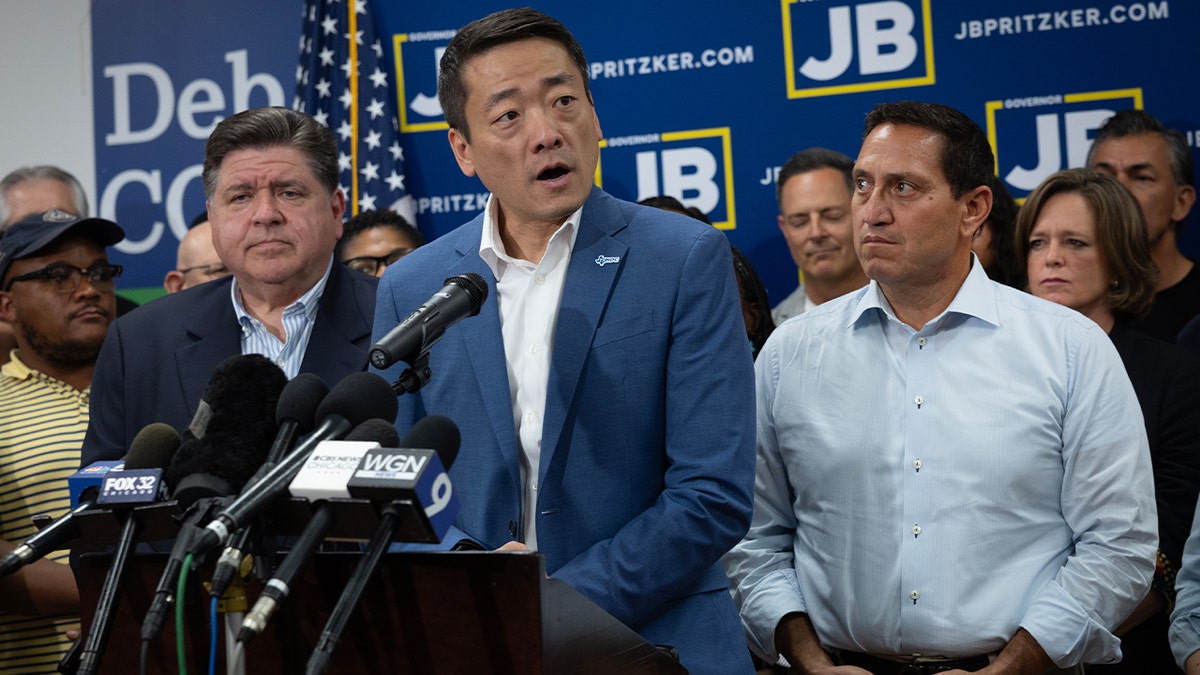
Illinois Governor JB Pritzker (L) and Texas Rep. Trey Martinez Fischer (R) listen as Texas House Democratic Caucus Chair Gene Wu speaks to reporters during a press conference at the DuPage County Democratic Party headquarters on August 03, 2025 in Carol Stream, Illinois. Wu was with a group of Democratic Texas lawmakers who left the state earlier today so a quorum could not be reached during a special session called to redistrict the state. (Scott Olson/Getty Images)
During a CNN interview Wednesday, O’Rourke was asked point-blank why he was helping Democrats flee Texas.
«We could see a similar scenario this time around. Is it worth it?» CNN anchor Pamela Brown asked in reference to O’Rourke’s 2021 efforts to obstruct Texas legislative proceedings.
CLICK HERE TO GET THE FOX NEWS APP
«Absolutely,» O’Rourke responded. «If we fail, the consolidation of authoritarian power in America will be nearly unstoppable.»
But Brown challenged O’Rourke on whether the funds might be «better spent» aiding vulnerable Texans instead.
«We’ve seen it in the past—they flee, but then inevitably they have to come back, right? You can’t just stay out in perpetuity, and the governor can continue to call these special sessions,» Brown said. «Do you think the money could be better spent helping those folks you mentioned?»
«I actually believe that they can stay out long enough to stop this steal in Texas,» O’Rourke responded.
Fox News Digital’s Anders Hagstrom and Kristine Parks contributed to this report.
beto orourke,texas,democratic party,controversies state and local,state and local,politics

 CHIMENTOS1 día ago
CHIMENTOS1 día agoMalas noticias para Wanda Nara: por qué la bajaron misteriosamente de MasterChef: «No va a salir este año»

 DEPORTE1 día ago
DEPORTE1 día agoEl Como de Fàbregas, el nuevo rico de Italia

 POLITICA1 día ago
POLITICA1 día agoSebastián Pareja justificó el armado de listas de LLA en la Provincia: “El desafío era dar una opción diferencial”



















